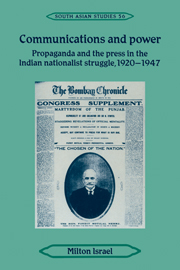Book contents
- Frontmatter
- Dedication
- Epigraph
- Contents
- Acknowledgements
- List of abbreviations
- Note on currency
- Introduction: politics and the press in a colonial setting
- 1 The Government of India: images and messages in the defence of authority
- 2 The news services: ‘impartial Reuters’ or ‘foreign pipes’
- 3 The Congress search for a common voice
- 4 The Bombay Chronicle: a case study
- 5 The struggle overseas
- Conclusion
- Bibliography
- Index
- Miscellaneous Endmatter
3 - The Congress search for a common voice
Published online by Cambridge University Press: 05 February 2015
- Frontmatter
- Dedication
- Epigraph
- Contents
- Acknowledgements
- List of abbreviations
- Note on currency
- Introduction: politics and the press in a colonial setting
- 1 The Government of India: images and messages in the defence of authority
- 2 The news services: ‘impartial Reuters’ or ‘foreign pipes’
- 3 The Congress search for a common voice
- 4 The Bombay Chronicle: a case study
- 5 The struggle overseas
- Conclusion
- Bibliography
- Index
- Miscellaneous Endmatter
Summary
Competing viewpoints and the question of unity
In his 1937 review of Indian politics in the eighty years since the Mutiny, C. Y. Chintamini described the Congress as a propaganda organization ‘in which there is no room for more parties than one’. It was committed to the advocacy of particular opinions, he insisted, and its programme would be crippled by the inclusion of parties ‘speaking in different voices’. In the early 1920s, Chintamini had attacked the Non-cooperation Movement and an intolerant Gandhi-controlled Congress. In the late 1930s, still on the margins of nationalist action, he attacked Jawaharlal Nehru's socialist ideology and a Congress which remained, in his view, intolerant of other viewpoints. Chintamani was particularly offended by Congress insistence that it alone represented the views and interests of the Indian people; and that such an argument was sufficient to reject alternative positions and demand unity and loyal support. ‘Vox populi, vox Dei is a doctrine not less dangerous’, he insisted, ‘than the counter-doctrine of the divine right of kings.’ In the Congress, as it had developed since the end of World War One, to outsiders like Chintamani, both phenomena seemed apparent.
Throughout the 1920s and 1930s, as the endgame of the nationalist struggle approached, the search for a ‘voice’ that would be perceived as widely shared and representative reflected renewed concern within the Congress about both the divide-and-rule tactics of the British regime, and the reality of the range of divisions among Indians that might be mobilized by a different vision of freedom, a different ‘voice’.
- Type
- Chapter
- Information
- Communications and PowerPropaganda and the Press in the Indian National Struggle, 1920–1947, pp. 156 - 215Publisher: Cambridge University PressPrint publication year: 1994
- 1
- Cited by

